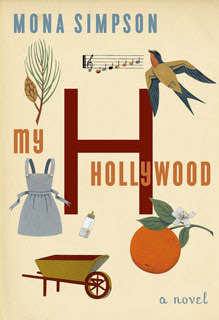My Hollywood by Mona Simpson
A New Novel from the author of Anywhere But Here
At 5 pm promptly the composer puts aside her work, comes downstairs, chops up a salad, stops being an artist, and becomes a mother. With her child and her nanny for company, she eats her evening meal at the dining table. This is the new American family unit—part-time mommy, full-time nanny, and child—and it is built for efficiency.
But a study found that twenty-two countries are happier than the US. “Why do you think that is?” asked a Latino busser at the restaurant where I work, half singing while he refilled baskets with tortilla chips.
“Because we all want to be a little famous” was my reply.

In her new novel, My Hollywood, Mona Simpson explores this suggestion. “Odd” is how the book’s main mom, Claire, the classical composer and cellist, describes herself. While most of the mothers around her seek to be small, private celebrities in the eyes of their husbands—so rarely do they put their always freshly manicured hands on their children—some of them are actual celebrities, and this complicates things. The Hollywood setting makes Claire’s search for success through music seem a little less glamorous. She writes symphonies, yet she isn’t familiar with LA hairdressers. What all these moms have in common, however, is a resistance to letting motherhood dissolve any parts of their hard-earned individuality.
The two most common reasons for a child to resent his or her parents are too much attention or not enough. And thus there are dueling stereotypes for these LA moms—either they are like the Juicy-Couture wearing mother in Mean Girls, constantly wanting too much information, or else they come home late carrying a briefcase and never remove their Bluetooth headsets.
In My Hollywood, Simpson examines the delicate line a mother walks between disappointing herself as caregiver and disappointing herself as career-woman—two roles that rarely lend to the success of the other. Confession: I had Mona Simpson as a writing professor at UCLA and she said to us “it’s strange to me!” about hiring help, but there she was, sitting at the head of an attentive class while she said these words. Her children were at home with the nanny.
But what a revelation then for me to see that, although Simpson keeps up the lifestyle of her family by taking on the services of workers with foreign accents, in her new book she not only acknowledges her nanny, but gives her a piece of the fame by including the often-ignored perspective of these 9 to 5 surrogate moms. Housekeepers, maids, nannies—however you label them—are pretty common in Los Angeles. An afternoon of cleaning, or just a child kept quiet, can cost the same as a blouse from Nordstrom Rack. But Simpson makes a good observation—if we cannot ignore them, if we take on their private lives, they are not really doing their jobs. I know that I get cranky when the sound of the vacuum wakes me at 9 am, but I also know that the housekeeper who is using it woke up at 5 am to take the bus to get to my house on time.
This is a little like an unnerving realization that Claire has in the book. As she hands her nanny money, Claire imagines all the other hands—the hands of the nanny’s children, and of her grandchildren—that also reach out for that same money. And she knows that the nanny gives it to them.
Simpson thus highlights the drastic contrast between these lives that run silently parallel, but brushing shoulders, in the homes of families with hired help. Alongside the millions of degrees of sacrifice that modern mothers constantly navigate there are these other, ordinarily less visible demands that shape the lives of their hired helpers. Ultimately, and perhaps most surprisingly, My Hollywood shows just how much your housekeeper buys into the God-like image you have of yourself as you leave your damp jogging shorts on the floor.



